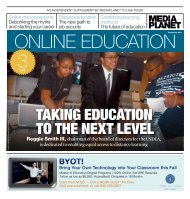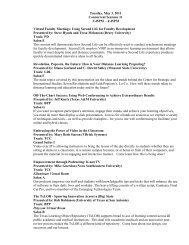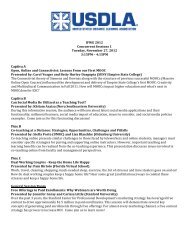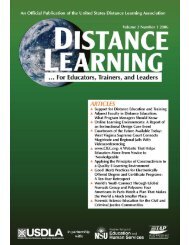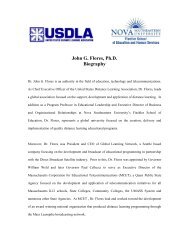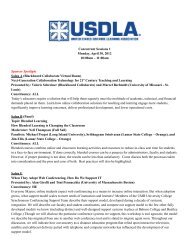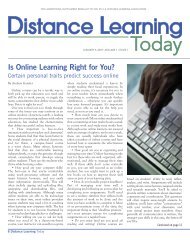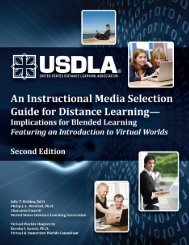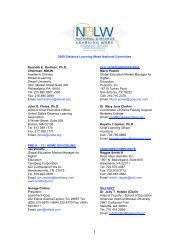United States Distance Learning Association
United States Distance Learning Association
United States Distance Learning Association
- No tags were found...
You also want an ePaper? Increase the reach of your titles
YUMPU automatically turns print PDFs into web optimized ePapers that Google loves.
draw, but in reality distance learning is<br />
very challenging for many students, so<br />
those who choose distance learning for the<br />
sake of convenience are in for a major<br />
shock, and will likely not persevere. I think<br />
that in many areas, there is an advantage<br />
to having both distance learning and faceto-face<br />
instruction, simply because it helps<br />
learners develop the full gamut of skills<br />
that a university education can offer.<br />
QUESTION: Has higher education started<br />
down a slippery slope by giving students too<br />
much freedom in moving away from a face-toface<br />
experience at least for younger undergraduate<br />
students<br />
The slippery slope, in my estimation, is<br />
the focus on market-driven approaches to<br />
education. This creates a highly prevalent<br />
idea that the customer of education is the<br />
student. I could not disagree more—the<br />
customer for higher education is society.<br />
By focusing on the learner as customer,<br />
higher education is changing in ways that,<br />
in my view, may not server either the student<br />
or the university.<br />
QUESTION: The concept of learner as customer<br />
seems to be quite prevalent in higher education.<br />
Can you elaborate on why you think this<br />
approach may not serve the student or the university<br />
At the broadest level, I believe that the<br />
purpose of education is—quite simply—to<br />
make a better person. A better person, in<br />
my estimation, is a person who is not only<br />
self-reliant and able to be effective in his/<br />
her job, but also someone who has the<br />
skills and desires to positively impact the<br />
world, and to leave this little planet behind<br />
in better shape than he/she found it. So, I<br />
feel that the customer of education is society.<br />
Ultimately, education should seek to<br />
shape each of us to be better “tools” with<br />
which to improve the world.<br />
This view contrasts significantly with<br />
what we often see in higher education<br />
nowadays. Because of the focus on education<br />
as a market-driven phenomenon, we<br />
start applying all kinds of business terms to<br />
the different components of the higher<br />
education system. A class or a learning<br />
experience becomes a “service.” We look at<br />
the value of a degree in terms of “return on<br />
investment.” We see distance education as<br />
an approach to improve “efficiency” and<br />
to achieve “economies of scale.” Lastly, we<br />
label the individual learner as “the customer.”<br />
While there is certainly some merit<br />
to recognizing that higher education is a<br />
business, I feel that we are making a mistake<br />
by taking this concept as far as we do.<br />
Here is how the issue of learner as customer<br />
can pan out: There is a common<br />
mantra in all business settings that “customer<br />
is king” or “the customer is always<br />
right.” If I order an item from a menu in a<br />
restaurant and I don’t like it, I can tell the<br />
waiter that I don’t like the item and would<br />
like to return it. I can exchange it for something<br />
else or I can just walk out without<br />
paying for the item. I have this “right” even<br />
if the menu item is exactly as it was<br />
described on the menu, and my only<br />
objection is that I just don’t like the way it<br />
tastes (i.e. nothing is missing from the dish,<br />
nothing is rotten, etc.). What is happening,<br />
in my experience, is that this very same<br />
thing is cropping up in our higher education<br />
classes. I can give you a couple of concrete<br />
examples:<br />
I know of a faculty member who on the<br />
first day of class in a grad course, had a student<br />
walk in and say; “this is my last<br />
semester in the program, I have a 4.0 GPA,<br />
so I need to get an A in this class.” Then,<br />
the student just stood there and stared at<br />
the professor. The student did not express<br />
any desire in knowing what it would take<br />
to get an A, nor did she express an interest<br />
in committing herself 100% to the class in<br />
order to maintain her 4.0. The student simply<br />
was expressing that as a customer, she<br />
expected that in exchange for paying<br />
tuition she would basically be eligible for<br />
an A. And that it was the professor’s<br />
82 <strong>Distance</strong> <strong>Learning</strong> Volume 4, Issue 4



